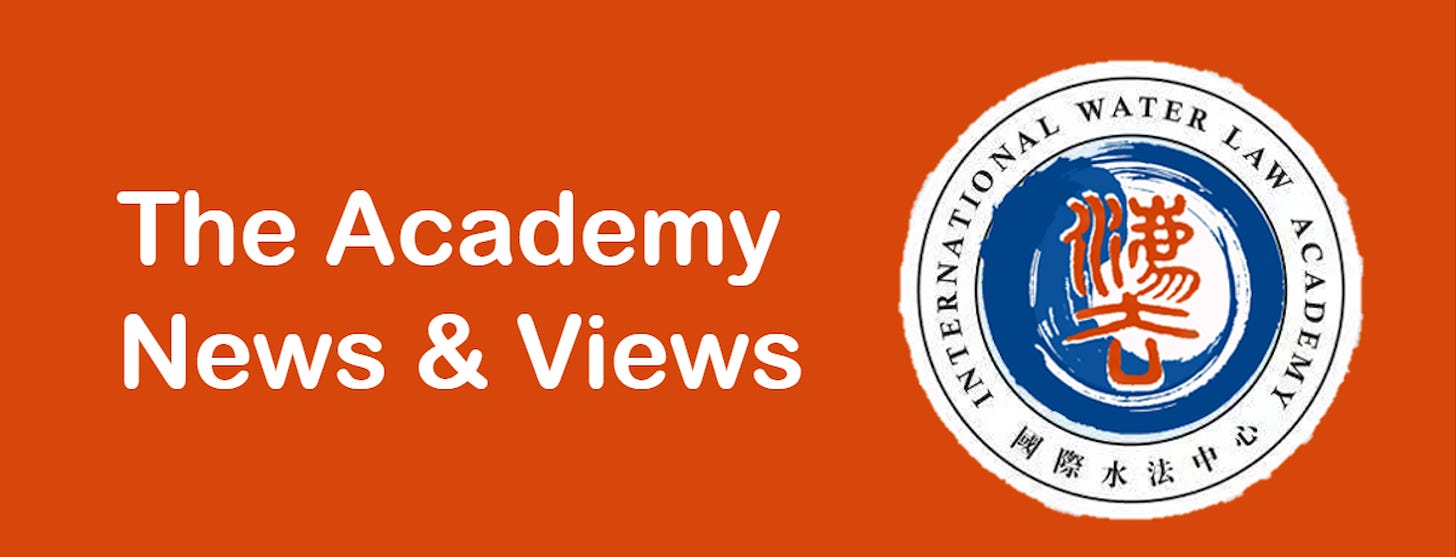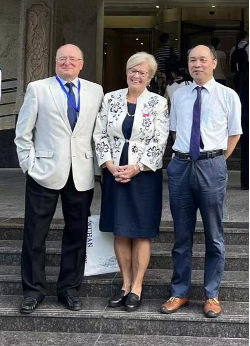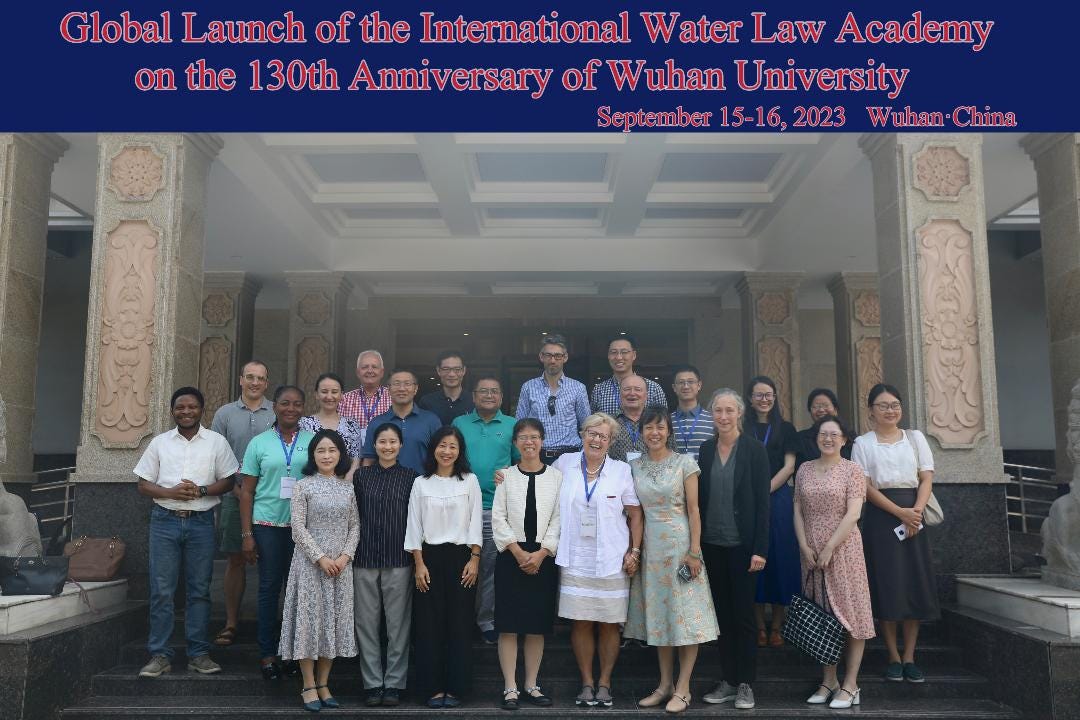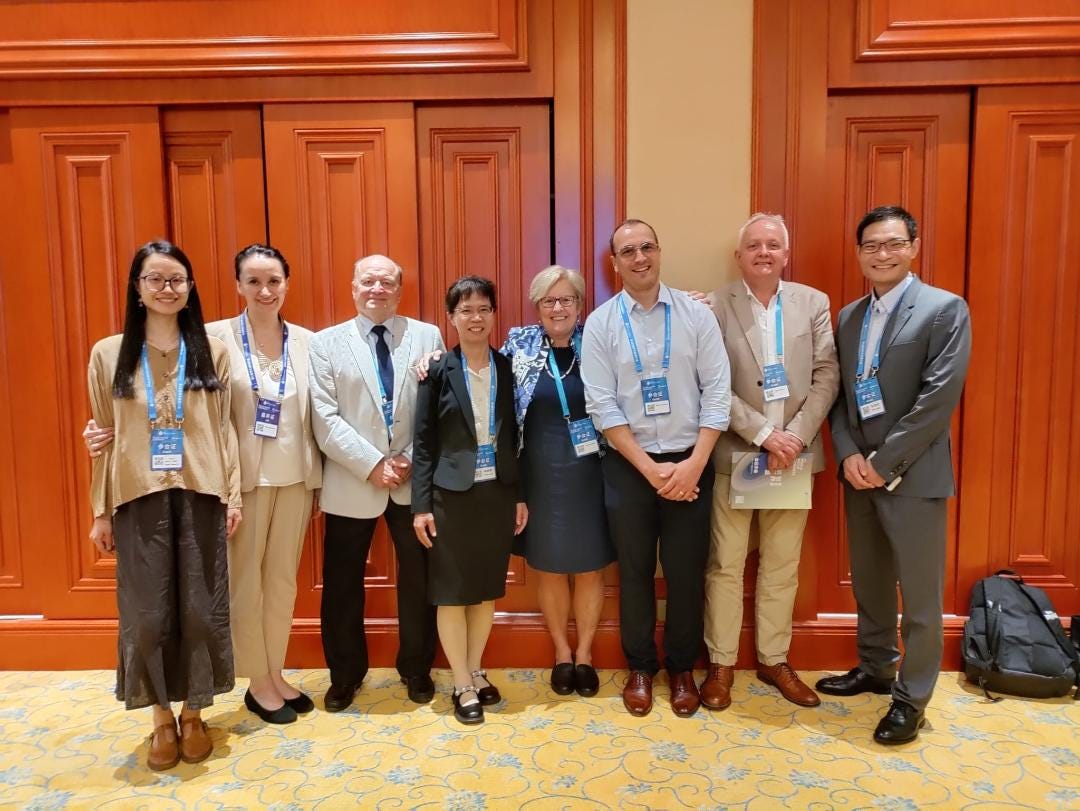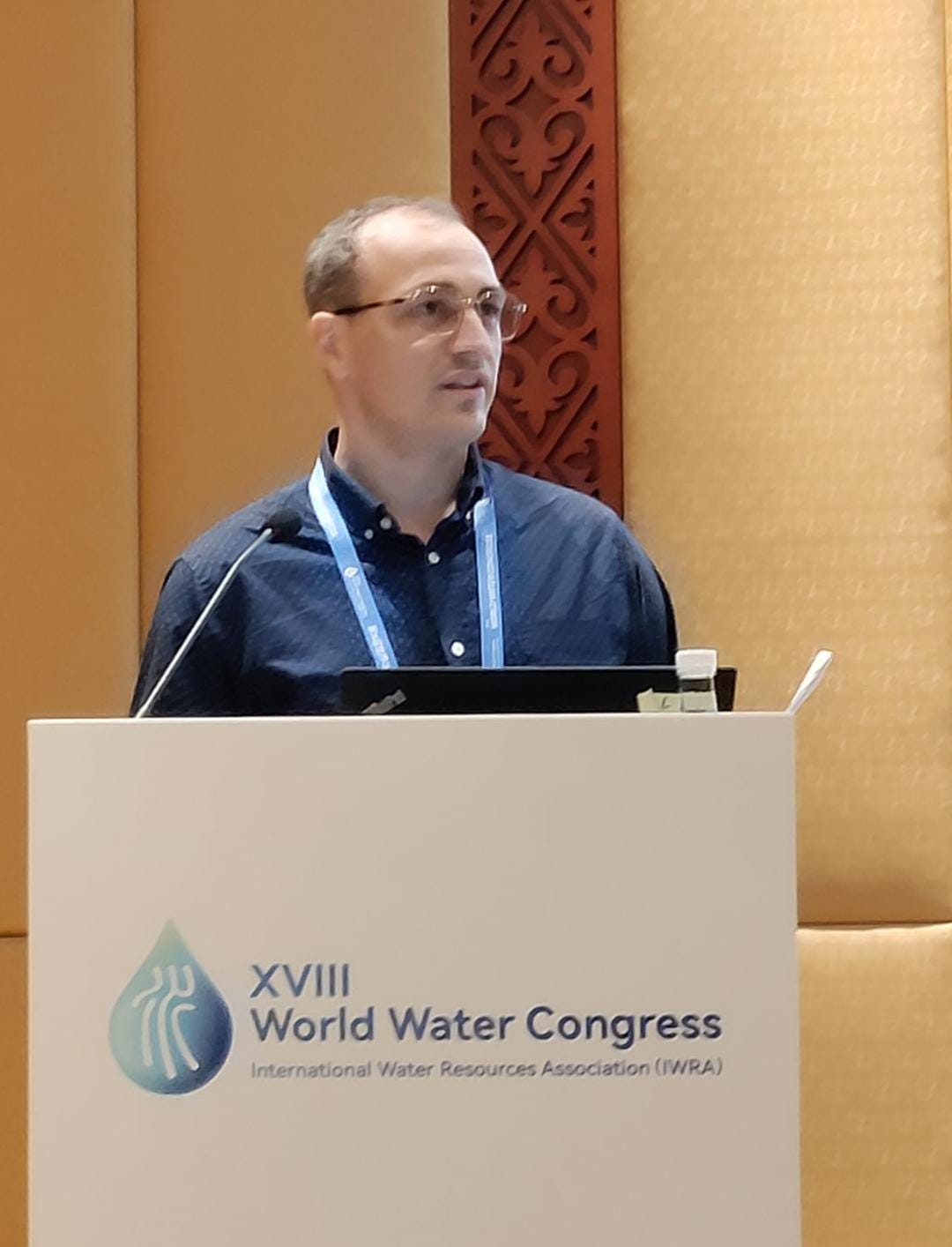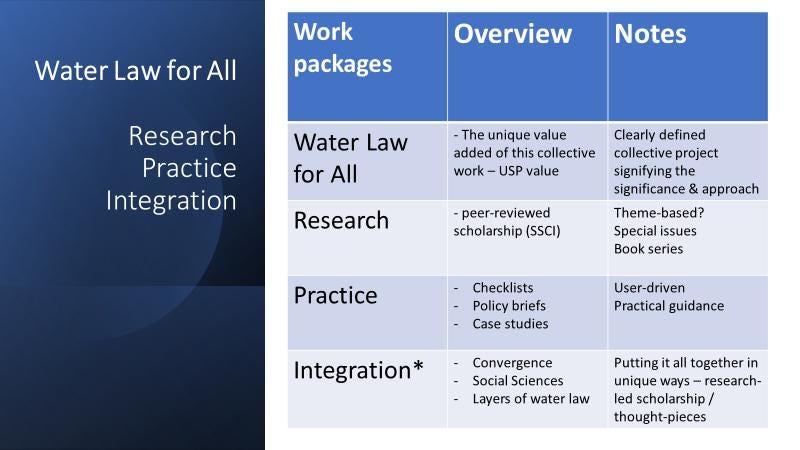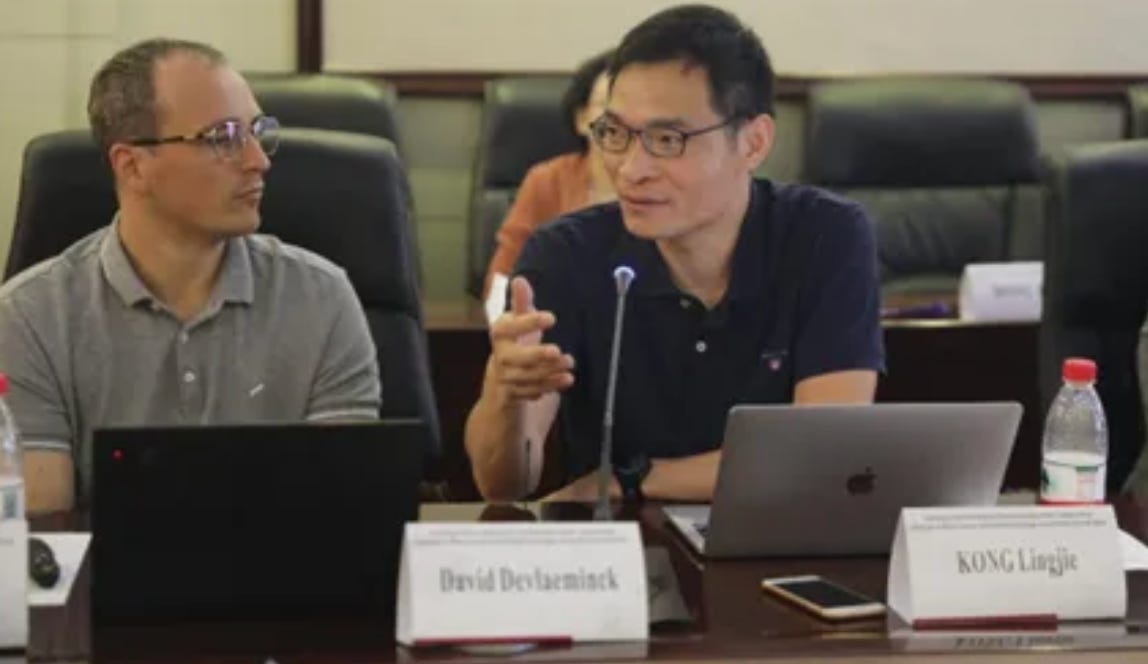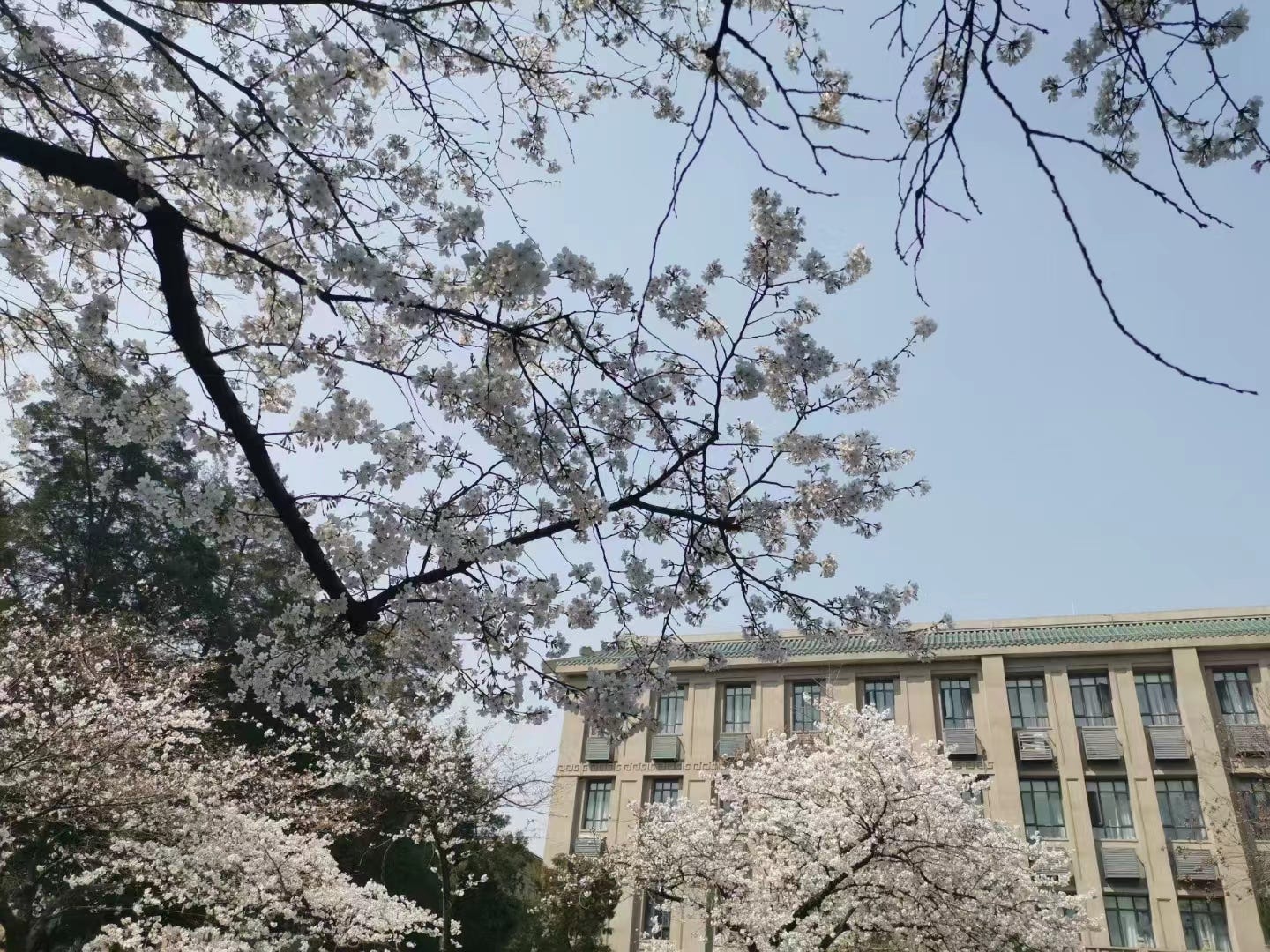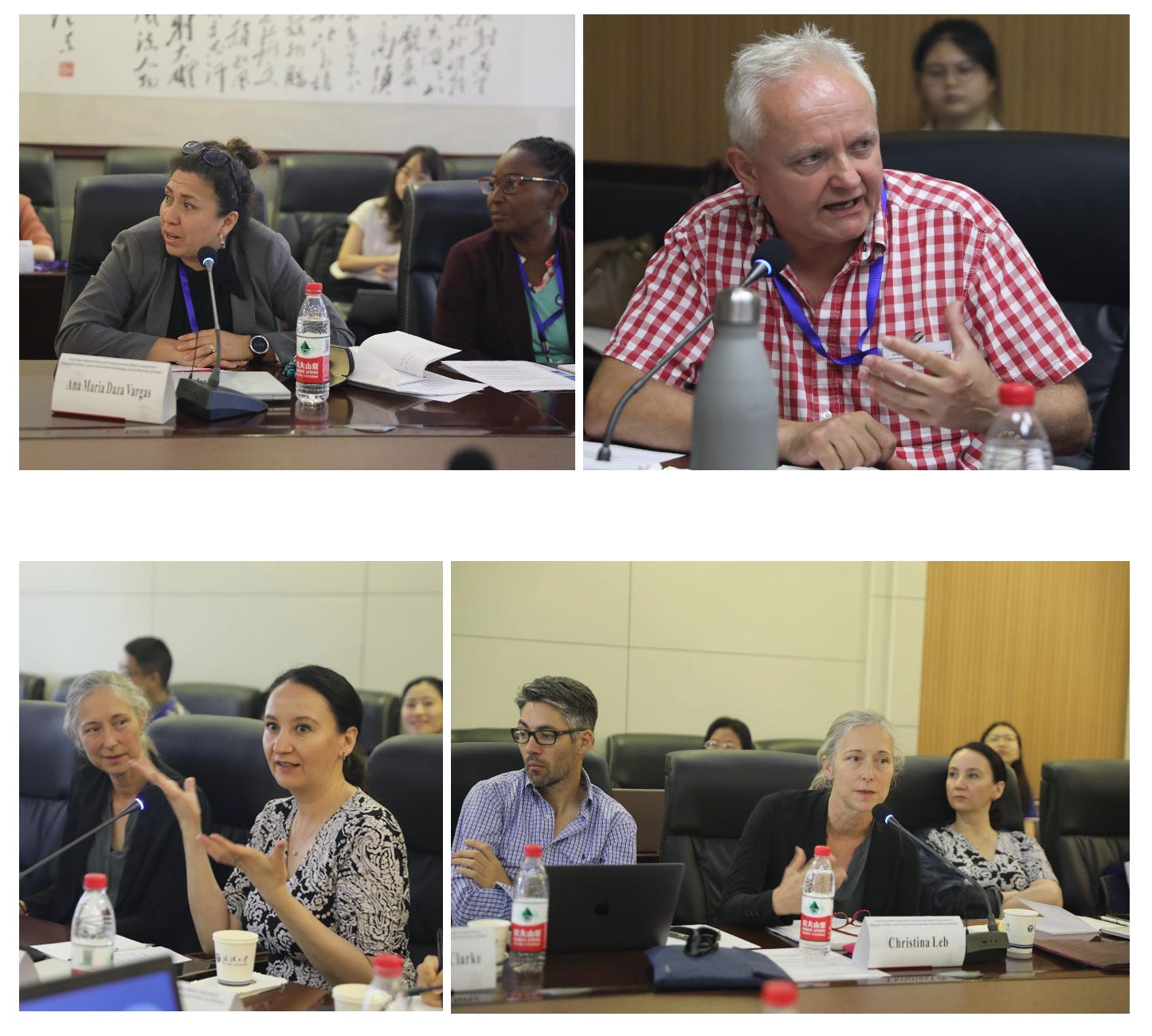October 2023
News & Views - China Meetings
Message from the Director of the International Water Law Academy, Professor Patricia Wouters
Welcome to this October issue of IWLA’s ‘News and Views’ Substack Newsletter. September was a big month for the Academy with two important meetings. Building momentum and demonstrating impact, the Academy hosted two special sessions on International Water Law (IWL) at the International Water Resources Association (IWRA) World Water Congress, 11-15 September in Beijing. Accelerating forwards, back at the campus of our ‘home base’, Wuhan University, on September 15-16, we held our Global Launch Conference.
Above from left to right is Prof. Sergei Vinogradov, a founding Affiliate, Academy Director, Prof. Patricia Wouters and Prof. Yu Minyou, Dean of the China Institute of Boundary and Ocean Studies (CIBOS), Wuhan University, Professor of International Law.
Whilst the Academy has been active in its work since 2019, our official launch was delayed due to the Covid pandemic. Our four subsequent years of development culminated in a number of activities and meetings. Dovetailing with the 130th anniversary celebrations of Wuhan University, the Academy’s Global Launch contributed a new sightline for the Academy. The launch featured keynote speeches and a gala dinner followed the next day by a conference to look at a framework for a future research agenda and strategy in IWL. This meeting brought together water law experts to support improved transboundary water cooperation that advances the UN Sustainable Development Goals and the 2030 Agenda for Sustainable Development.
“The series of inaugural events for the Academy - in Beijing and in Wuhan - culminates many efforts of our Affiliates in bringing together our Community of Scholars. In Beijing at the IWRA Water Congress the Academy shared its expertise across a range of areas of water law - international, transnational and national. In Wuhan our Affiliates from across the globe engaged in lively debate over how water law might help to address serious challenges in three broad areas - Water and Peace; Water and Climate Change; and Water and Sustainable Development. We now work together to bring our findings together to disseminate more broadly through scholarship and practice. I would like to express my deepest thanks to all of the Affiliates who were able to join us, and gratitude to CIBOS, Wuhan University for all of their support.”
International Water Resources Association World Water Congress.
Beijing, China - 11-15 Sept 2023
The Academy convened two special sessions on international water law at the IWRA World Water Congress under Theme # 6 – Innovation for Water Governance and Management. Hosted by the International Water Resources Association and the Ministry of Water Resources of China. This year’s theme was: “Water for All: Harmony between Humans and Nature”.
Below are some of the members of the delegation from the Academy at the IWRA World Water Congress in Beijing: from left to right Dr. Yang Liu, Dr. Dinara Ziganshina, Prof. Sergei Vinogradov, Dr. Chen Huiping, Prof. Patricia Wouters, Dr. David Devmaelinck, Prof. Owen McIntyre and Prof. Kong Lingjie.
IWLA Special Sessions
Implementing effective transboundary water cooperation – the integral role of Water Law – an innovative integrated approach to meet the UN SDGs, chaired by Prof. Patricia Wouters. (September 13)
Charting a Path to 2030 and Beyond: exploring how convergent rules of international law contribute to enhanced transboundary water cooperation, chaired by Dr David Devlaeminck, (September 14), shown below.
Global Launch of the Academy
Charting a Path to Enhanced Transboundary Water Cooperation:
Innovative Water Law to Tackle Hard Challenges to Meet the UN Sustainable Development Goals.
Wuhan University, 15-16 September 2023.
Above: Prof. Patricia Wouters, Director of the Academy with Vice President of Wuhan University, Dr. TANG Qizhu
The Academy’s Charting a Path Initiative
In 2020 the Academy introduced its initiative Charting a Path to 2030 and beyond, to examine the hard issues like climate change and to seek responses and solutions to the problems facing transboundary water management. The Wuhan meeting explored how convergent rules of international law contribute to transboundary water cooperation and to the Water Action Agenda established at the UN Water Conference in New York in March 2023. This initiative will culminate with a collection of articles in a special issue emerging from the themes discussed at the Academy Wuhan Conference. The chart below summarises the outcomes of the Wuhan Meeting.
Since it was established in 2019, the International Water Law Academy, continues to grow and now has a global network of close to 60 Affiliates, each with expertise relevant to transboundary water law. The Wuhan conference took this forward through three broad cross-cutting themes: Water and Peace; Water and Climate; Water and Sustainable Development.
Affiliate Focus – Interview with Founding Affiliate Professor Kong Lingjie
Dr. KONG Lingjie is a Professor of International Law at China Institute of Boundary and Ocean Studies (CIBOS), and the Institute for International Studies (IIS) of Wuhan University, and a Founding Affiliate member of the Academy. His research and teaching focus on international water law, the law of the sea, international environmental law, and international dispute settlement. Prof. Kong is the Associate Dean for Research and International Collaboration at CIBOS and IIS. He provides legal advice to relevant departments of the Chinese government ministries of Foreign Affairs, Water Resources, and Natural Resources, China.
Q1. How did you get into the field of international water law, and what are your recent published works and the research in progress, and what are their impacts?
I have a broad interest in public international law, and I see myself as a generalist. I do not look at IWL from the perspective of water law but international law. I did not get into IWL until I started my teaching and research at CIBOS in 2008. It all began with a phone call from Beijing from a colleague at the Chinese Ministry of Water Resources, who invited me to participate in a large research project on the protection and development of international watercourses. As the only international lawyer on the project my task was to provide a solid legal basis for the whole project. It was an amazing experience working on a multi-disciplinary team with water scientists and engineers. Based on the results of this project, I published a treatise on international water law in Chinese in 2011 with Dr. TIAN Xianrong. Writing this book compelled me to dig into the sources, principles, rules, and the interpretation, application, and implementation of IWL.
My work on international water law is largely research interest and project driven. In 2016, Prof HE Daming of the Institute of Asian International Rivers, at Yunnan University, led a big group of climate change, water, and environment experts, and applied for and won a large research project from the Chinese Fund for Natural Sciences Research. The theme of the project was management of transboundary waters in the context of climate change from the perspective of benefit sharing. I was the principal investigator for the sub-project on international water law. This teamwork broadened my horizons, insights, and perspectives on transboundary water issues. I also helped the colleagues to better comprehend the legal norms governing the use and protection of transboundary waters, particularly those concerning benefit sharing among the watercourse States and other stakeholders. Apart from our research report, my team collected and studied the major cases at international courts and tribunals concerning the use and protection of transboundary waters and published a book on the cases.
In the past years, I also had the pleasure working closely with other IWLA affiliates, particularly Professors Patricia Wouters, Sergei Vinogradov, Owen McIntyre, Alistair Rieu-Clarke, CHEN Huiping, QIN Tianbao, Associate Prof. David Devlaeminck, and Dr Otto Spijkers. With Prof. Wouters, Prof. McIntyre and Dr. Devlaeminck, I co-edited the REICIEL Special Issue on International Water Law. Dr. Spijkers, Prof. Franck Mae, Prof. QIN Tianbao, and I co-edited the Chinese Journal of Environmental Law Special Issue on Water Law as Environmental Law. Working with these extraordinary people is always an excellent experience. I believe international water lawyers are tasked to promote the role of this important field of public international law for facilitating the goals of maintaining peace and security, implementing sustainable development, safeguarding human rights, and preventing, mitigating, and adapting to the impacts brought by climate change.
Above: Wuhan Campus, Wuhan, China.
Q2. What was the IWL significance of the recent Global Launch of the Academy, that you helped make such a success?
The event was planned long before Covid, and it had to be re-scheduled because of Covid restrictions. We are all extremely pleased that we were able to do the Global Launch in September 2023 at Wuhan University. It was a success, and it couldn’t have been better. It was my privilege and pleasure to welcome and host the participants, particularly those that have travelled from other continents. It was thrilling to meet old and new friends in person.
The Chair Professorship inaugural lecture of Prof. Patricia Wouters, titled “New Waves in International Water Law-Communities, Cooperation, and Integrated Water Law”, was remarkable. I look forward to reading the first draft of the paper she is to write based on the lecture. The Workshop was structured under three main themes: Water and Peace, Water and Climate Change, and Water and Sustainable Development. We had the pleasure of hearing excellent presentations given by Prof. Owen McIntyre, Dr. Christina Leb, and Dr. Ana Maria Daza Vargas. The presentations have also generated wide engagement from the discussants and the other participants. I must express again my gratitude and appreciation to all the participants for their contribution to the event.
As Prof. Wouters eloquently argued at her inaugural lecture, IWL is about communities, and it is about people. I would also say that the IWLA is an intellectual community for IWL people. The potential for research in IWL and its role in promoting peace, stability, and sustainable development of all countries and people of the world is immense. I trust that we can do more, and achieve more, and deliver more, together under the leadership of the Director of the Academy, Prof. Patricia Wouters.
In Pictures - Lively Debate at the Wuhan Conference
Above participants in discussion, shown from left to right. Top row: Dr. Ana-Maria Daza Vargas, Dr. Bernadette Adjei, and Prof. Owen McIntyre. Bottom row: Dr. Christina Leb, Dr. Dinara Ziganshina and Prof. Alistair Rieu-Clarke.
Thank you to all our Global Affiliates and scholars who attended the Wuhan Meeting!
Special thanks to our Chinese team in Wuhan and especially to Ms. Tian Yunhe and Dr. Yang Liu for all their work in the meeting arrangements.
Communications Team:
Dale Campbell and Tian Yunhe
Affiliates – share your news with us for future issues of Substack News & Views, email us at: Dale.IWLA@proton.me



